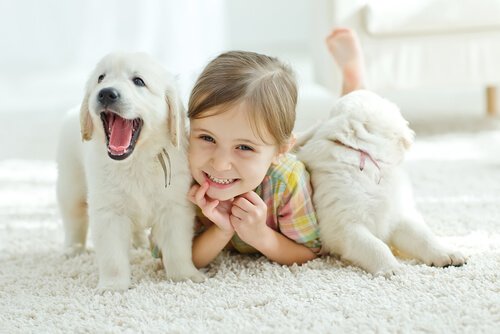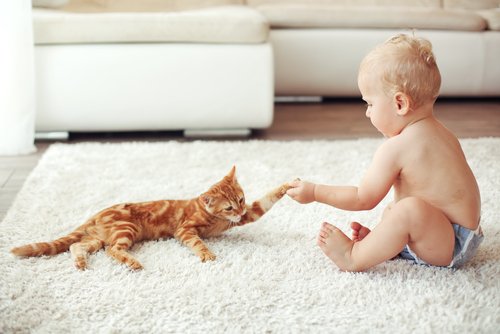Why Pets Make Babies Healthier

Pets bring many benefits to children. Studies show that babies who have the company of a furry friend are in contact with a lot of bacteria. Therefore, their immune system gets accustomed to these bacteria. And they develop self-protection mechanisms, and grow stronger.
Ear infections

Otitis, ear infections, is a common ailment in babies. However, different studies show that babies who live with dogs and cats are less likely to suffer from ear infections. Or, they have them to a lesser degree. In addition, children needed to take fewer medications, even when they had the disease.
Improves the immune system
As we have seen, a baby living with a furry friend at home has more contact with the outside world. When the dog goes out on the street during his daily walks, they carry microorganisms home. And this, according to the experts, is good for the little one. Basically, it contributes to “strengthening the baby’s immune system”. The antibodies rearm themselves. In other words, the child grows stronger and more protected from infections.
Benefits for the rest of the family
The positive effects of having at home a dog or cat at home have been analyzed by numerous studies, not only with children, but also with adults. These studies concluded that the life expectancy of people who had suffered a heart attack increases when they are living with a dog, thus reducing the risk of cardiovascular attacks.
In the case of the elderly, dogs and cats will reduce the risk of suffering from depression and other psychological problems associated with loneliness. Among other things, they benefit from taking responsibility to take care of their furry friends. And the animals know how to give a lot of affection back, which is what our elders need.
Learning about responsibility from pets
Living with pets can have very positive benefits for the psychological development and the personality of the child. In this way, the child will learn to avoid disturbing the pet while it eats or sleeps, clean its food dish, and treat it it kindly.
These activities help the child develop a sense of responsibility and understand the needs of others. In addition, physical contact will give them tactile experiences, allowing them to develop self confidence, socialize better, and to interact in relationships with others.
In the case of children with social problems, autism, Down’s syndrome, etc., having a dog at home can connect a child with the world that surrounds him. Having a pet is not just about petting and playing, it is also about caring, feeding and cleaning. A child learns all of this, helping him to be more responsible when caring for living things and in with completing daily chores.
Other benefits of having pets

When it comes to learning, on many occasions, when a child begins to read, he or she may feel pressured by parents or siblings to progress quickly and match the abilities of other children. So that your little one won’t feel pressured, you can encourage him to read to the pet, because he will not interrupt the child or pressure him to read faster. The child will feel more comfortable, and the animal will be the perfect study companion.
Children who have pets show greater control over their impulses. They can also improve their social skills with other children and increase their self-esteem. They can enjoy being at home with a furry friend and companion who will love them as they are, without asking for anything in return, and who won’t make demands of any kind. All they have to do is reciprocate that affection.
